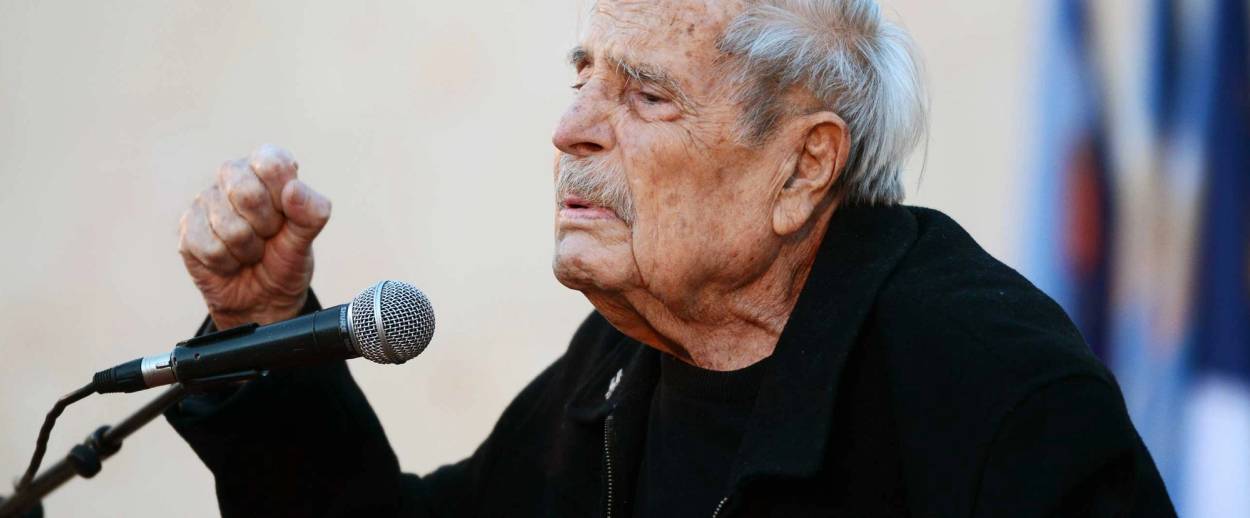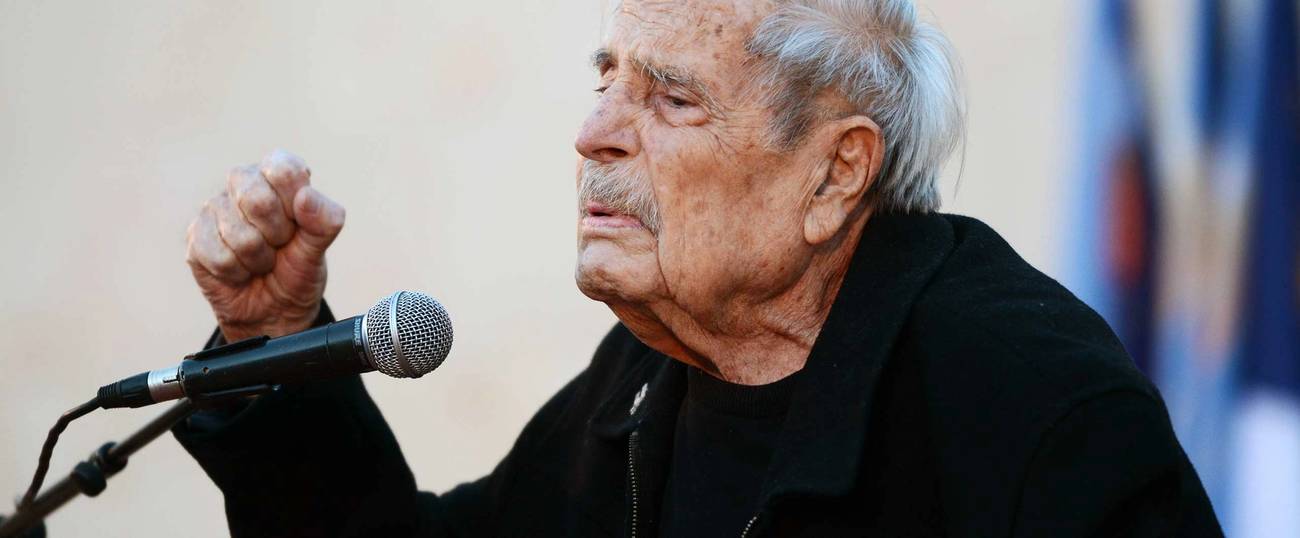Dying a Zionist After Refusing a Zionist Prize
A last interview with Haim Gouri




The iconic Israeli writer, filmmaker, and Palmach commander Haim Gouri died on Jan. 31 of this year. Shortly after his death at 94, HaMusach, a literary journal hosted on the Israel National Library’s website, published an interview of Gouri by Anat Sharon-Blais and Shiri Lev-Ari that focused on his refusal to accept a prize for “Zionist works of art.” In the interview, a lightly edited version of which appears below, as translated by Lonnie Monka, Gouri oscillates strongly between criticisms of contemporary Israel and its politics and his unflinching pride in being a Zionist: “I was born a Zionist, all my life I fought as Zionist, and I will die a Zionist.”
Do you know that by refusing to accept the Zionist prize, you have expressed a statement rich in meaning for many people?
I couldn’t have imagined what has taken place in response. They chose my last book, which is very dear to me. The prize was contemptible in my eyes. What is it called? The Zionist Creativity Prize? What isn’t Zionist here? The prize is a way to bypass the Israel Prize. The former minister, Limor Livnat, came up with the idea, and right from the beginning I didn’t like it.
I was also against this prize because, at the end of the day, 20 percent of the Israeli population are Arabs; you can’t create a prize that excludes them. I hate this whole government, but the people chose, the people chose. But the moment that they chose me, there was no prize that I lacked. I received the Israel Prize, the Bialik Prize, 15 prizes all together. The first film I wrote received an Oscar nomination.
I was born a Zionist, all my life I fought as Zionist, and I will die a Zionist. Zionism is the soul of my existence. I am a member of the generation of 1948. I am also from the generation that arrived from afar, who saw how the chosen people became a people chosen for annihilation. I lived with Holocaust survivors in Europe after the war. Someone needs to explain what Zionism means to me? Absurd!
Do you think that a younger person, perhaps someone who has not experienced winning prizes, would have dared to refuse it?
No. I wrote a letter to the judges, I didn’t want to hurt them. Two of them are acquaintances of mine. I told them that I suggest giving the prize to a young poet. I was in my 20s when I received the first prize in my life; it was for my book Flowers of Fire. For a young person, it’s an opportunity for encouragement and recognition. What I couldn’t have imagined was the public response, which ended up being so immense.
How do you explain it? You seem to have touched a nerve.
I had never imagined that my personal story would become such a political spectacle—becoming both spiritual and political. It was a cry of protest from a generation I was part of. A generation that was created in this land. More than the Bilu’im crowd, it is a generation of hard work, kibbutzim, culture, and universities. A generation that is a part of this story that fell into threatening times. Those were threatening times.
Walking with one of my granddaughters on a visit to South Tel Aviv, someone recognized me from television. He hadn’t read a line of my writing, but he said, “You writers, you are the leftists, you are the kibbutzniks, because of you they are slaughtering our sons!” This was during Operation Protective Edge. I wanted to answer him, but one of my granddaughters grabbed me and said, “You do not know how this will end.” Suddenly I realized the depth of hatred on our side. He didn’t know that throughout all the wars the kibbutz movement had lost three times more people than any other sector. He didn’t know about the towns of Negba, or Yad Mordechai, about the Palmach men who fought.
When you look at Israeli society and you say that we are in a bad times, what is there to do? What is the first step for a course of action?
I do not give advice, it’s terribly complicated. Everything is complicated. The biggest good fortune was for those who arrived here, the Jews of Germany who managed to reach the land of Israel and had a hard time. To see the greatest literary critic of Europe standing on Mograbi Boulevard selling sausages. And he had a sense of humor to wear a tailcoat. Doctors and lawyers became laborers. Jews from the Arab countries, I do not want to get into that issue now. But whoever came to Israel was saved! After the slaughtering began, who could have stayed? In the terror of that horrible, fraternal war of theirs, the first thing was to finish off the Jews. It was terribly difficult, but whole families came.
There is a terrible misunderstanding between the different peoples of this nation. Where did it come from? After so many years of unity, of the IDF.
We’re in the shadow of Ben-Gurion; he called out to the desert. I once asked people in Dimona, “You were the first to come to this desert. Nothing was here. You redeemed it. Before Dimona, a living soul couldn’t be found a few dozen kilometers past Be’er Sheva. Why are you so angry with the kibbutzniks from Degania till today? Why don’t you pass on some pride to your children and grandchildren?”
There was an amazing answer: “Because the people of Degania chose to be there, they wanted to be there, while we were unloaded from trucks one night. They told us ‘south of Be’er Sheva,’ before we travelled into the middle of the desert, and they told us to get off the truck. We said ‘this can not be, it’s unreal.’ We called the scene dimyona [her imagination], from the word dimyon [imagination]. In the morning the sun rose and woke us up in the middle of the desert. We began to cry, and then we called the place Dimona.”
How is it possible, amidst all the the different peoples here, to create a common denominator, at a time when the secret weapon deployed during elections is hatred? This horror of Benjamin Netanyahu, which changed the entire election process, giving himself four mandates. This horror wherein he speaks about tens of thousands of Arabs flocking in the cars of leftists. How can this manner of speech be forgiven?
As an older man, I remember the civil wars in this country; during the British mandate, the militant Betar activists would begin to beat Etzel members out in the streets. Today there’s nothing close to that, they would beat each other to death. I also remember Begin’s demonstration against the reparations from Germany; at that time, nobody dreamed that those things would happen. Etzel members gathered in Zion Square and Begin spoke to them. As a journalist I stood there, hearing that speech for myself. In the middle of the speech, in the midst of incredible tension—the police stood organized from further up the street all the way to the Knesset—someone passed him a note. He opened the paper, and softly called out (I call it the “murmur screamed”), “My brothers and sisters, at this moment I have been informed that these police, organized before you, are in possession of tear gas bombs produced by IG Farben, the same company that produced the gas that poisoned our sisters and mothers.” He started to cry. Then he closed his fist around the note, and said, “Go my children, and may all those who stand before you be smashed like glass against a rock.” The crowd rose and scuttled between the police, heading up the street toward the Knesset as they were dealt heavy blows.
Later on, after I had defended Herut Knesset members from being put on trial, I received a letter from Ben-Gurion. He sent me a very offensive letter in which he compared Begin to Hitler seven times. Afterwards, those two made amends because Begin suggested that Ben-Gurion be prime minister on the eve of the Six-Day War. We didn’t fabricate this hatred, but somehow it emerged with a kind of decency.
The country is full of hatred. This fact frightens me. Why am I optimistic? I met with an entire group of young people, and I said that today’s political life is backwards, there are terrible crises, but there are also great elites. They heard the word “elites” and wanted to murder me. Here in Israel they hate the term “elite,” they think it is Ramat Aviv Gimmel, the Ashkenazim, the millionaires.
So I told them, “Look, there’s no nation without elites.” Then the voices started up. “So tell me what an elite is.” I told them, “There’s a 720-page book, but you do not have time to read it, so take out paper and pencil, and I’ll tell you what an elite is: An elite is an ivory tower that contributes to a national power by means of a national culture that is universal, while living in constant moral distress due to the same society it operates in and creates. This elite consists of professors, as well as teachers and doctors, and drivers, and fighters. Anything that contributes to national power, but not to chauvinism.” And suddenly this very matter-of-fact answer seemed acceptable to them. They saw that I was not speaking down to them, and they were grateful for it.
I want to believe that even in this crisis, this thousand-year-old nation will arise as a responsible elite that will be able to cope with a wild and bloody region like the one it finds itself in. As such, this current state of affairs, it can’t continue.
***
You can help support Tablet’s unique brand of Jewish journalism. Click here to donate today.
Lonnie Monka lives in Jerusalem.